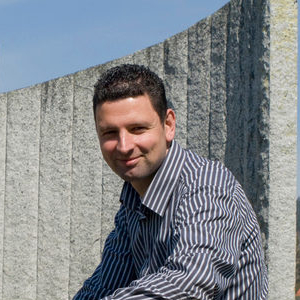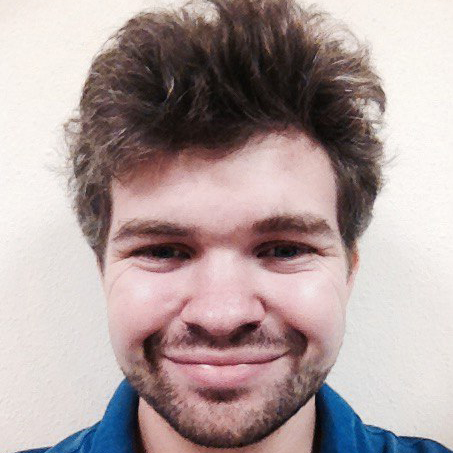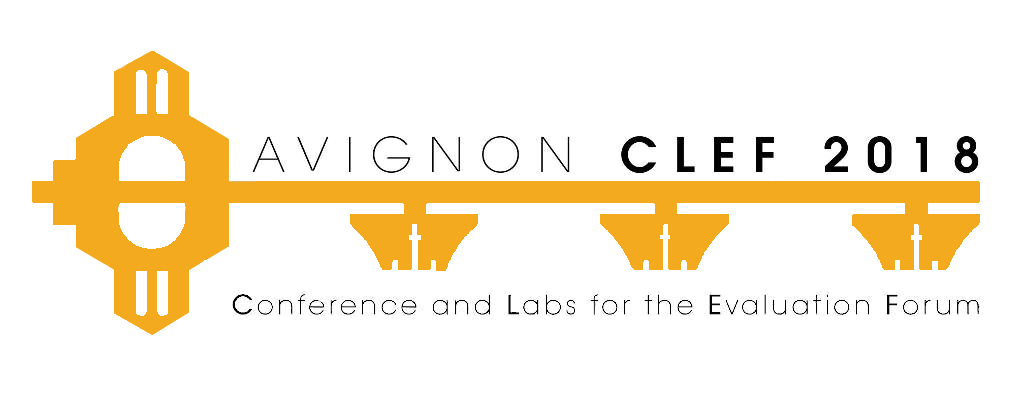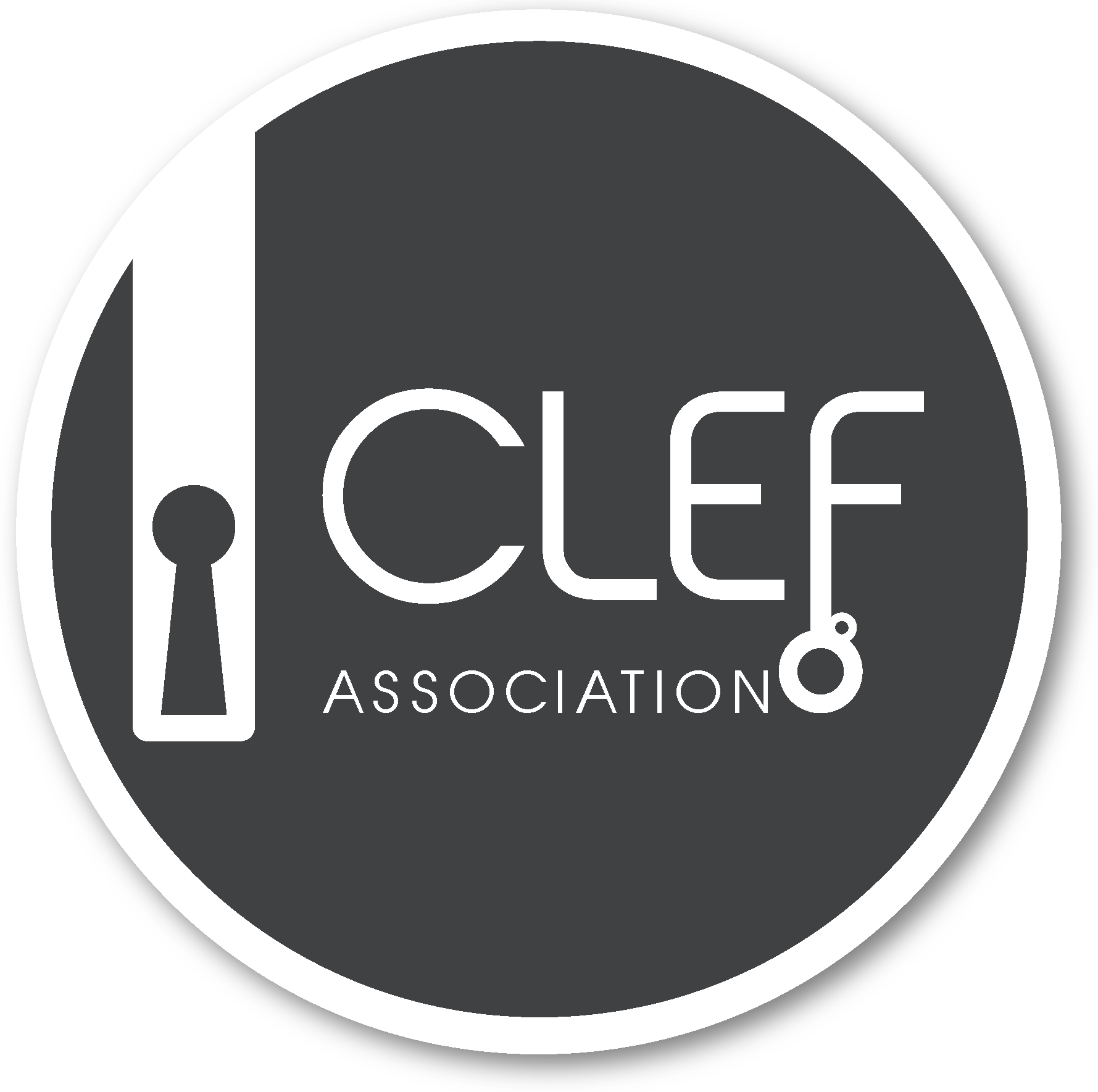| September 10 |
|
09:00-10:30
|
Labs Overviews |
|
Overview of PAN 2018: Author Identification, Author Profiling, and Author
Obfuscation
Efstathios
Stamatatos, Francisco Rangel, Michael Tschuggnall, Benno Stein, Mike Kestemont, Paolo
Rosso,
Martin Potthast |
|
11:00-12:30
|
Best of Labs 2017 |
|
Hierarchical Clustering Analysis: The best-performing approach at PAN 2017 author clustering
task
Helena Gómez-Adorno, Carolina Martín-Del-Campo-Rodríguez, Grigori Sidorov,
Yuridiana
Alemán, Darnes Vilariño Ayala and David Pinto |
|
Session 1, Chair: Paolo Rosso |
| 14:30-15:20 |
Keynote: Profiling Depression and Anorexia in Social Media
David Losada |
| 15:20-15:40 |
Overview of the 6th Author Profiling Task at PAN 2018: Multimodal Gender Identification in
Twitter
Francisco Rangel, Paolo Rosso, Manuel Montes-y-Gómez, Martin Potthast, Benno
Stein |
| 15:40-16:00 |
Text and Image Synergy with Feature Cross Technique for Gender Identification
Takumi
Takahashi, Takuji Tahara, Koki Nagatani, Yasuhide Miura, Tomoki Taniguchi, Tomoko Ohkuma
|
| 16:00-16:30 |
Break |
|
Session 2, Chair: Francisco Rangel |
| 16:30-16:50 |
Gender Identification in Twitter using N-grams and LSA
Saman Daneshvar, Diana
Inkpen
|
| 16:50-17:10 |
Character-based Convolutional Neural Network and ResNet18 for Twitter Author
Profiling
Nils
Schaetti |
| 17:10-17:50 |
Keynote: Demystifying Psychometric Marketing: Multi-View Learning as a New Social Media User
Profiling Standard
Aleksandr Farseev |
| 17:50-18:00 |
Discussion |
| 19:00-23:00 |
City Tour |
| September 11 |
| 13:30-14:30 |
Poster Session |
|
Author Profiling using Word Embeddings with Subword Information
Rafael Felipe
Sandroni
Dias, Ivandré Paraboni |
|
Character-based Convolutional Neural Network for Style Change Detection
Nils
Schaetti
|
|
Bidirectional Echo State Network-based Reservoir Computing for Cross-domain Authorship
Attribution
Nils Schaetti |
|
Gender Prediction From Tweets With Convolutional Neural Networks
Erhan Sezerer, Ozan
Polatbilek, Özge Sevgili, Selma Tekir |
|
CIC-GIL Approach to Cross-domain Authorship Attribution
Carolina
Martín-Del-Campo-Rodríguez, Helena Gómez-Adorno, Grigori Sidorov, Ildar Batyrshin |
|
Complexity Measures and POS n-grams for Author Identification in Several Languages
Rocío
López-Anguita, Arturo Montejo-Ráez, Manuel C. Díaz-Galiano |
|
Authorship Profiling Without Using Topical Information
Jussi Karlgren, Lewis
Esposito,
Chantal Gratton, Pentti Kanerva |
|
Authorship Attribution with Neural Networks and Multiple Features
Łukasz Gągała
|
|
Stacked Gender Prediction from Tweet Texts and Images
Giovanni Ciccone, Arthur
Sultan,
Léa Laporte, Elöd Egyed-Zsigmond, Alaa Alhamzeh, Michael Granitzer |
|
Gender Identification through Multi-modal Tweet Analysis using MicroTC and Bag of Visual
Words
Eric S. Tellez, Sabino Miranda-Jiménez, Daniela Moctezuma, Mario Graff,
Vladimir
Salgado, José Ortiz-Bejar |
|
Multi-Language Neural Network Model with Advance Preprocessor for Gender Classification over
Social Media
Kashyap Raiyani, Teresa Gonçalves, Paulo Quaresma, Vítor Beires
Nogueira
|
|
Multilingual Author Profiling using LSTMs
Roy Khristopher Bayot, Teresa Gonçalves
|
|
Session 3, Chair: Efstathios Stamatatos |
| 14:30-14:50 |
Overview of the Author Obfuscation Task at PAN 2018: A New Approach to Measuring Safety
Martin
Potthast, Felix Schremmer, Matthias Hagen, Benno Stein |
| 14:50-15:00 |
UniNE at CLEF 2018: Author Masking
Mirco Kocher, Jacques Savoy |
| 15:00-15:15 |
Overview of the Author Identification Task at PAN-2018: Cross-domain Authorship
Attribution
Mike
Kestemont, Efstathios Stamatatos, Walter Daelemans, Benno Stein, Martin Potthast
|
| 15:15-15:30 |
EACH-USP Ensemble Cross-domain Authorship Attribution
José Eleandro Custódio, Ivandré
Paraboni |
| 15:30-15:45 |
Dynamic Parameter Search for Cross-Domain Authorship Attribution
Benjamin Murauer,
Michael Tschuggnall, Günther Specht |
| 15:45-16:00 |
Cross-Domain Authorship Attribution Based on Compression
Oren Halvani, Lukas
Graner
|
| 16:00-16:30 |
Break |
|
Session 4, Chair: Mike Kestemont |
| 16:30-17:15 |
Keynote: Competent Men and Warm Women: On the Detection and Origin of Gender Stereotyped
Image
Search Results
Jahna Otterbacher |
| 17:15-17:30 |
Overview of the Author Identification Task at PAN-2018: Style Change Detection
Michael
Tschuggnall, Günther Specht, Benno Stein, Martin Potthast |
| 17:30-17:45 |
An Ensemble-Rich Multi-Aspect Approach Towards Robust Style Change Detection
Dimitrina
Zlatkova, Daniel Kopev, Kristiyan Mitov, Atanas Atanasov, Momchil Hardalov, Ivan Koychev,
Preslav Nakov |
| 17:45-18:00 |
Detecting a Change of Style using Text Statistics
Kamil Safin, Aleksandr Ogaltsov
|
| 19:00-24:00 |
Social Event: Théâtre des Halles |
| September 12 |
|
08:00-10:30
|
Best of Labs 2017 |
|
Simply the Best: Minimalist System Trumps Complex Models in Author Profiling
Angelo
Basile, Gareth Dwyer, Maria Medvedeva, Josine Rawee, Hessel Haagsma and Malvina Nissim
|
| 17:00-18:00 |
2019 Labs Kickoff and Closing Discussion Forum |
| 19:00-24:00 |
Social Event: Théâtre des Halles & Music Festival |













